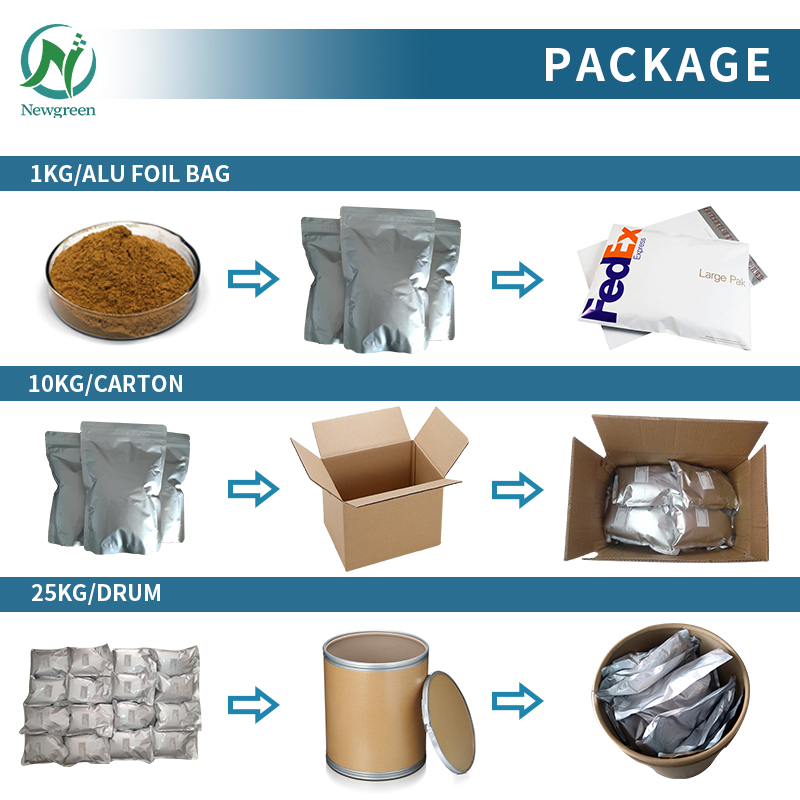Newgreen Factory Supply myricetin High Quality 99% Famotidine Powder

Product Description
Famotidine is an H2 receptor antagonist, mainly used to treat diseases related to gastric acid. It inhibits histamine H2 receptors in gastric parietal cells, reduces gastric acid secretion, and thus relieves symptoms caused by excessive gastric acid. The following is a detailed introduction to Famotidine:
Main Features and Functions
1.Mechanism: Famotidine inhibits the secretion of gastric acid and reduces the acidity in the stomach by selectively antagonizing the H2 receptors on the gastric parietal cells.
2.Indications:
- Gastroesophageal Reflux Disease (GERD): Used to relieve symptoms caused by acid reflux, such as heartburn and acid regurgitation.
-Peptic ulcer: used to treat gastric ulcer and duodenal ulcer and promote ulcer healing.
-Prevention of Gastric Acid-Related Disorders: In certain situations, Famotidine may be used to prevent gastric acid-related disorders caused by medications such as NSAIDs.
3.Dosage form: Famotidine is usually available in the form of oral tablets and injections, and patients can take it according to the doctor's advice.
4.Adverse Reactions: Famotidine is generally well tolerated, but some side effects may occur, such as headache, dizziness, diarrhea or constipation.
5.Precautions for use: When using Famotidine, patients should inform their doctors if they have other health problems or are taking other medications to avoid potential drug interactions.
Summarize
Famotidine is an effective H2 receptor antagonist, mainly used to treat gastric acid-related diseases, such as gastroesophageal reflux disease and peptic ulcers. By reducing gastric acid secretion, Famotidine can relieve related symptoms and promote healing. When using it, you should follow the doctor's instructions to ensure safety and effectiveness.
COA
| Items | Specifications | Results |
| Appearance | Off-white or white powder | White Powder |
| HPLC Identification | Consistent with the reference
substance main peak retention time |
Conforms |
| Specific rotation | +20.0。-+22.0。 | +21。 |
| Heavy metals | ≤ 10ppm | <10ppm |
| PH | 7.5-8.5 | 8.0 |
| Loss on drying | ≤ 1.0% | 0.25% |
| Lead | ≤3ppm | Conforms |
| Arsenic | ≤1ppm | Conforms |
| Cadmium | ≤1ppm | Conforms |
| Mercury | ≤0. 1ppm | Conforms |
| Melting point | 250.0℃~265.0℃ | 254.7~255.8℃ |
| Residue on ignition | ≤0. 1% | 0.03% |
| Hydrazine | ≤2ppm | Conforms |
| Bulk density | / | 0.21g/ml |
| Tapped density | / | 0.45g/ml |
| Assay(Famotidine ) | 99.0%~ 101.0% | 99.65% |
| Total aerobes counts | ≤1000CFU/g | <2CFU/g |
| Mould & Yeasts | ≤100CFU/g | <2CFU/g |
| E.coli | Negative | Negative |
| Salmonella | Negative | Negative |
| Storage | Store in cool & drying place, keep away strong light. | |
| Conclusion | Qualified | |
Function
Famotidine is an H2 receptor antagonist, mainly used to treat diseases related to gastric acid. It works by inhibiting histamine H2 receptors in gastric parietal cells, reducing gastric acid secretion. The following are the main functions of Famotidine:
1.Reduce gastric acid secretion: Famotidine significantly reduces gastric acid secretion by antagonizing H2 receptors, helping to relieve symptoms caused by excessive gastric acid.
2.Treatment of gastroesophageal reflux disease (GERD): Famotidine can be used to treat gastroesophageal reflux disease, relieving heartburn and discomfort caused by gastric acid reflux.
3.Treatment of peptic ulcer: Famotidine is used to treat gastric ulcer and duodenal ulcer, promote ulcer healing, and reduce the risk of recurrence.
4.Prevention of postoperative gastric acid secretion: After certain surgeries, Famotidine can be used to prevent excessive gastric acid secretion and reduce the risk of postoperative complications.
5.Relieve stomach acid related symptoms: Famotidine can help relieve symptoms caused by stomach acid, such as stomach pain, indigestion and bloating.
Usage
Famotidine is usually available in the form of oral tablets or injections, and the specific dosage and frequency of use should be adjusted based on your doctor's advice.
Adverse Reactions
Famotidine is generally well tolerated, but some side effects may occur, such as headache, dizziness, diarrhea, or constipation.
In conclusion, Famotidine is an effective H2 receptor antagonist, mainly used to treat gastric acid-related diseases, helping patients relieve symptoms and promote healing. When using it, you should follow the doctor's instructions to ensure safety and effectiveness.
Application
The application of Famotidine is mainly focused on the treatment of diseases related to gastric acid, including the following aspects:
1. Gastroesophageal Reflux Disease (GERD): Famotidine is used to relieve symptoms caused by acid reflux, such as heartburn, acid regurgitation, and chest pain. It relieves these symptoms by reducing the secretion of stomach acid.
2.Peptic ulcer: Famotidine is used to treat gastric ulcer and duodenal ulcer, helping to promote the healing of ulcers and relieve associated pain and discomfort.
3.Prevention of gastric acid-related diseases: Famotidine can be used to prevent gastric acid-related diseases caused by drugs such as nonsteroidal anti-inflammatory drugs (NSAIDs), especially in high-risk patients.
4.Zollinger-Ellison syndrome: Famotidine can also be used to treat this rare disease, which causes excessive secretion of stomach acid.
5.Postoperative gastric acid management: After certain surgeries, Famotidine can be used to control gastric acid secretion and reduce the risk of postoperative complications.
Usage
Famotidine is usually provided in the form of oral tablets. Patients should take it according to their doctor's advice. The dosage and frequency of use will vary depending on the specific condition.
Notes
When using Famotidine, patients should inform their doctors if they have other health problems or are taking other medications to avoid potential drug interactions. In addition, although Famotidine can effectively control gastric acid secretion, patients should seek medical attention if symptoms persist or worsen.
In conclusion, Famotidine is an effective H2 receptor antagonist that is widely used in the treatment of gastric acid-related diseases, helping patients relieve symptoms and promote healing. It should be used under the guidance of a doctor to ensure safety and effectiveness.
Package & Delivery



















